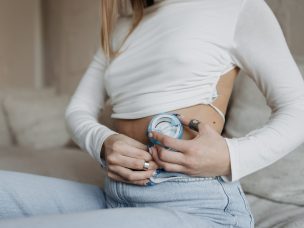Endocrinology
Effects of Healthcare Disruptions During the Pandemic on Diabetic Veterans
The COVID-19 pandemic disrupted many healthcare-related activities. This study analyzed the long-term effects of these disruptions on veterans with diabetes. Many groups that rely on routine, in-person healthcare were expected to experience at least partial disruptions due to the COVID-19 pandemic, as confirmed by emerging studies. However, the full impact that the pandemic had on...
Solving the Racial Disparity in Diabetic Foot Ulcer Prevalence
Diabetic foot ulcers can cause a wide range of complications, but more aggressive management solutions and population-based screenings can help decrease their burden. Diabetic foot ulcers are one of the most prominent sources of preventable morbidity among adults with diabetes and can result in declining function, infection, hospitalization, amputation, and even death. With a lifetime...
Disparities in Technology Use Among Black Individuals With Diabetes
Persistent racial disparities exist among Black and non-Black individuals with type 1 diabetes. This study examines these disparities as they relate to the use of diabetes technology, such as insulin pumps. Among children and adolescents with type 1 diabetes, there are racial disparities regarding the use of insulin pumps and continuous glucose monitors. These devices...
Social Determinants of Health and Disparities in Obesity Among Latinos
Social factors can influence metabolic health conditions in prominent ways, and this study shows that in Southern California, Latinos are much more likely to face these health risks. Social determinants of health, which describe the complex web of factors that can impact an individual before birth and during their lifespan, help give context to community-level...
AHA News: This Is Your Brain on Love
You walk into the room and see their face. They smile at you and look into your eyes. And just like that, your heart drops to your feet and you can’t speak. At least, not coherently. What’s happening to your brain? Falling in love may make you feel like it has turned to mush, but...
Q & A with Danielle Bublitz, MS, RD, on Diabetes
Danielle Bublitz, MS, RD is a registered dietitian and certified intuitive eating counselor. She created her own online company in November 2021 called Food Freedom Diabetes, LLC to assist people with diabetes, and she also works as a clinical dietitian on a per diem basis. In this interview, Danielle Bublitz sheds more light on Diabetes....
Decreased Use of New Medications in Minority Populations with Diabetes
Research suggests that minorities are less likely to be prescribed newer diabetes medications than their White counterparts of similar socioeconomic status and diabetes management. As of 2021, the United States Food and Drug Administration (FDA) approved nearly 60 drugs for treating Type 2 Diabetes, and almost 100 additional antidiabetic agents were evaluated in clinical trials1....
Clinical Diabetes Trials and Minority Underrepresentation
Minority underrepresentation in clinical trials can adversely affect patient outcomes in minority populations and further increase racial disparities. Racial disparities in clinical trials adversely affect patient outcomes in minority populations. Although historically, Black populations have been used as unconsenting research participants in studies such as the Tuskegee Syphilis Experiment which began in 1932, or the...
Early Identification of Diabetes in Minority Populations
Research shows that Asian, Hispanic, and Black Americans are at increased risk for diabetes at lower weights and younger ages than White Americans. Adult-onset diabetes is one of the most common chronic conditions in adults in the United States. According to the Centers for Disease Control’s (CDC) 2021 statistics, 11.3% of the U.S. population has...
More Medical News














